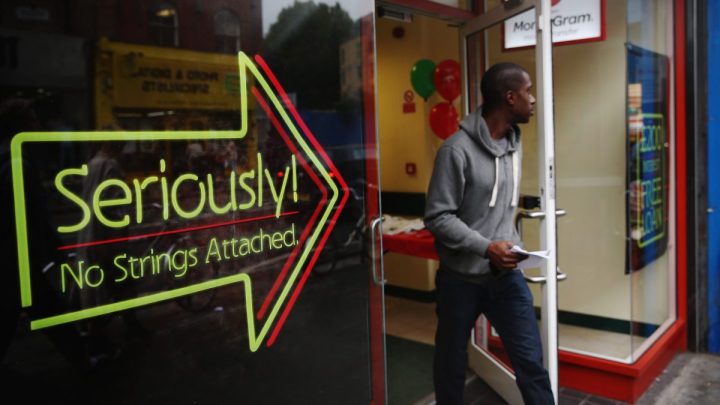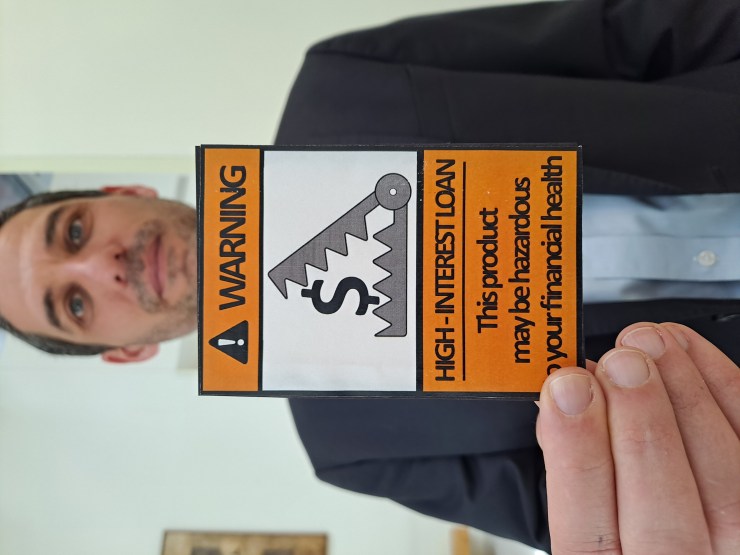
Could financial warning labels help borrowers avoid risky loans?
Could financial warning labels help borrowers avoid risky loans?

If a product can affect your physical health in a negative way, like cigarettes, alcohol or prescription meds, it will come with a warning label — sometimes a vivid one — telling you what you’re about to put in your body.
But if a product could be detrimental to your financial health, like a payday loan, there’s no such label to caution consumers.
While it’s true that, per the federal Truth in Lending Act, lenders do need to disclose to borrowers what they’re signing up for, how much the interest rate will be, and how much they’ll pay back in the long run, the ways those terms are laid out are not uniform.
This is something Özgür Ince, a professor of finance at the University of South Carolina’s Darla Moore School of Business, wants to change. Ince would like to see a warning label attached to short-term, high-interest financial products like installment or payday loans.
He said these types of loans should be seen as potentially damaging to a person’s financial health and, thus, labeled in the same way as cigarettes.
“The equivalent of [the Food and Drug Administration] doesn’t exist in financial products,” Ince said. “There is no requirement that says, ‘Oh, here’s a warning label, like for tobacco, “This causes cancer.”’ There aren’t the same type of requirements for financial products.”
So if there were to be a warning label on loan applications or tacked to the front door of any storefront of a nonbank lender, what might it look like?
“Visually, very striking,” Ince said after a class in which he discussed financial warning labels with his students. Something that “communicates the idea without having to spend too much time on it or without having to think too deeply. Just, the idea that ‘this is something I need to be careful about.’”
Think orange blocks at a construction site, a dollar sign in the jaws of a bear trap or a no-nonsense message like “Warning! High-Interest Loan. This product may be hazardous to your financial health.”

In other words, a label that would be impossible to miss and almost as impossible to misinterpret. But would it do any good?
“I think that would work,” Ince said. “I think that would probably have a fairly big impact on people’s propensity to use these products.”
Andrea Drummond, a retired widow in Greenville, South Carolina, agreed. “If I saw this,” Drummond said while looking at a printout of Ince’s concept, “I would turn back around.”
Drummond turned to an auto title lender when she couldn’t cover medical bills and other expenses with her Social Security checks. She had no other way of getting a loan. Drummond said she wishes she would have seen a label like the one with a dollar-sign-eating bear trap before she put her car up as collateral and ended up buried in debt.
“With a warning sign like this,” she said, “it’s letting you know you’re getting yourself deeper and deeper in debt.”
“It would send a clearer message that this is a potentially dangerous product,” said Mike Litt, consumer campaign director at the U.S. Public Interest Research Group. “But a warning label does also sound to me a lot like a disclosure.”
A decade ago, PIRG advocated putting warning labels on prepaid debit cards. The idea never drew the attention of U.S. policymakers and no official push for any kind of financial warning label has caught wind since. Litt suspects that ultimately, a label — however bold and ominous — would not dissuade short-term borrowers in immediate need.
“At the end of the day,” Litt said, “a disclosure doesn’t really do you any good if you can’t afford to pay back the loan to begin with.”
Kerri Smith, South Carolina regional director of Self-Help Credit Union, tested Litt’s theory by showing a copy of Ince’s warning label concept to credit union customers.
“[I] asked them, would a warning label like this cause them pause?” she said.
The customers who had not turned to short-term products in a desperate hour unanimously said the label would have made them think twice about what they were signing up for.
But Smith also showed the label to borrowers who had turned to risky loans when they had no other options. “And when I asked them, ‘If these loans came with some type of warning label like this, do you believe this would’ve stopped you from taking out the loan?’ they all said no,” Smith said.
In fact, she said, those customers told her the label would not have even made them pause.
There’s a lot happening in the world. Through it all, Marketplace is here for you.
You rely on Marketplace to break down the world’s events and tell you how it affects you in a fact-based, approachable way. We rely on your financial support to keep making that possible.
Your donation today powers the independent journalism that you rely on. For just $5/month, you can help sustain Marketplace so we can keep reporting on the things that matter to you.











